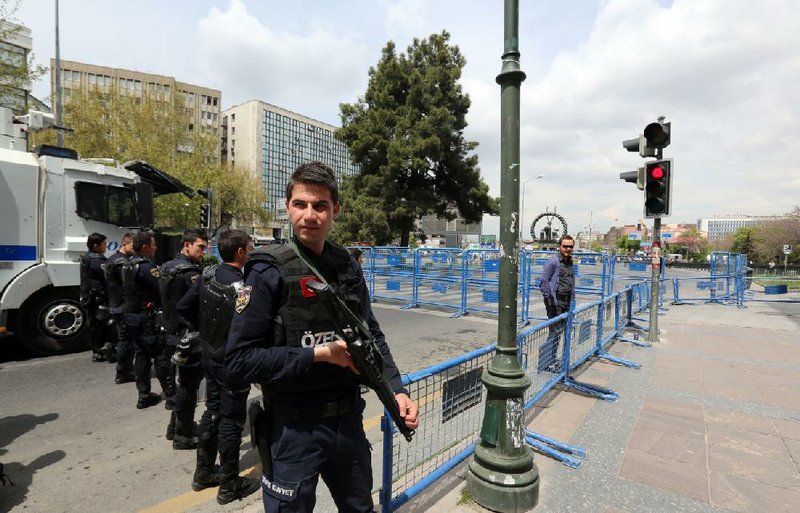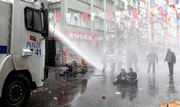HAVANA -- Leftist groups, governments and trade unions were staging rallies around the world Friday to mark International Workers Day.
Most events were peaceful protests for workers' rights and world peace. But May 1 regularly sees clashes between police and militant groups in some cities.
International Workers Day originates in the United States. American unions first called for the introduction of an eight-hour working day in the second half of the 19th century. A general strike was declared to press those demands, starting May 1, 1886.
The idea spread to other countries, and since then workers around the world have held protests on May 1 every year.
In Turkey on Friday, police and May Day demonstrators clashed in Istanbul as crowds determined to defy a government ban tried to march to the city's iconic Taksim Square. Authorities blocked the square, which was the center of protests in which 34 people were killed in 1977.
Security forces pushed back demonstrators using water cannons and tear gas.
Protesters retaliated by throwing stones and hurling firecrackers at police.
Friday's demonstrations were the first large-scale protests since the government passed a security bill this year giving police expanded powers to crack down on protesters.
In Milan, police released water from hydrants against hundreds of demonstrators, many of them scrawling graffiti on walls or holding smoky flares during a march in the city, where the Italian premier and other VIPs were inaugurating Expo, a world's fair that runs for six months.
An hour into the march, protesters set at least one parked car on fire, smashed store windows, tossed bottles and chopped up pavement.
In South Korea, thousands of people marched in the capital, Seoul, for a third week to protest government labor policies and the handling of a ferry disaster that killed more than 300 people a year ago.
Demonstrators occupied several downtown streets and sporadically clashed with police officers.
Protesters tried to move buses used to block their progress. Police responded by spraying tear gas.
There were no immediate reports of injuries.
South Korean labor groups have been denouncing a series of government policies they believe will reduce wages, job security and retirement benefits for state employees.
More than 10,000 workers and activists marched in Manila, Philippines, and burned an effigy of Philippine President Benigno Aquino III to protest low wages and a law allowing employers to hire laborers for less than six months to avoid giving benefits received by regular workers.
Workers in metropolitan Manila now receive a $10.80 daily minimum wage after a $0.34 increase in March.
Although it is the highest rate in the country, it is still "a far cry from being decent," says Lito Ustarez, vice chairman of the leftist May One Movement.
In financially struggling Greece, an estimated 13,000 people took part in three separate May Day marches in Athens, carrying banners and shouting anti-austerity slogans. Minor clashes broke out at the end of the peaceful marches, when a handful of hooded youths threw a gasoline bomb at riot police. No injuries or arrests were reported.
Police in Berlin said Germany's traditional Walpurgis Night protest marking the eve of May 1 was calmer than previous years.
Several thousand people took part in anti-capitalist street parties in the north of the city. Fireworks and stones were thrown at police, injuring one officer. Fifteen people were detained. Elsewhere in the German capital revelers partied "extremely peacefully," police said Friday morning.
At noon, Green Party activists unveiled a statue at Alexanderplatz in central Berlin of Edward Snowden, Julian Assange and Chelsea Manning, considered heroes by many on the left for leaking secret U.S. intelligence and military documents.
In the central German city of Weimar, far-right extremists attacked a union event.
Police said 15 people were injured and 29 were arrested.
In Cuba, thousands of people converged on Havana's Plaza of the Revolution for the traditional May Day march, led this year by President Raul Castro and Venezuelan President Nicolas Maduro.
Maduro then flew back to Caracas, where he announced he was raising Venezuela's minimum wage by 30 percent to help workers being battered by the world's highest inflation.
In Moscow, tens of thousands of workers braved chilly rain to march across Red Square. Despite an economic crisis that is squeezing the working class, there was little if any criticism of President Vladimir Putin or his government.
In Spain, about 10,000 protesters gathered under sunny skies in Madrid to take part in a May Day march under a banner saying "This is not the way to come out of the financial crisis."
Spain's economy is slowly emerging from the double-dip recession it hit at the end of 2013, but the country is still saddled with a staggering 23.8 percent unemployment rate.
"There should be many more of us here," said demonstrator Leandro Pulido Arroyo, 60. "There are 6 million people unemployed in Spain, and many others who are semi-unemployed, who although they may be working don't earn enough to pay for decent food."
A Section on 05/02/2015

